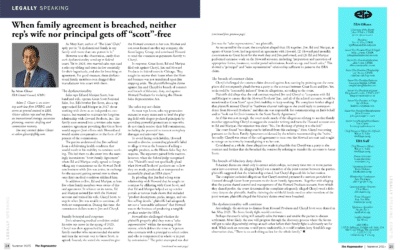Question: As the owner of a pass-thru entity, can I benefit by paying my state’s new pass- thru entity tax?
Answer: While state laws and situations vary, the new taxes many states throughout the country are imposing will likely benefit most entity owners. Although an additional tax is being paid, many business owners will receive a full credit against taxes they would otherwise be paying so they are in no worse position from having paid the tax. The ultimate benefit is that while many individuals have been unable to fully deduct their state and local tax payments in the past, the new pass-thru entity tax will provide some relief in this regard for Federal tax purposes.
Pass-thru entities are, generally speaking, those that are not subject to Federal tax at the entity level. Rather, Federal income taxes are reported by the owners on their personal income tax returns. The most common types of pass-thru entities are limited liability companies owned by more than one person, partnerships and S corporations.
The 2017 Federal Tax Cuts and Jobs Act imposed a $10,000 limit on the amount of state and local income tax taxpayers can deduct for Federal income tax purposes. Coupled with another change in the 2017 Tax Act increasing the threshold for claiming itemized deductions, many taxpayers are either limited in the amount of state and local taxes they can deduct and/or prevented from claiming any itemized deductions. By creating a Federal tax deduction which can be claimed regardless of whether taxpayers itemize deductions on their personal income tax returns, many pass-thru entity owners will benefit by paying the taxes imposed by their states.
While the laws of each state differ, a common statutory scheme involves a state imposing an income tax on the entity itself which would not otherwise have been imposed. The entity pays the state income tax and the business owner receives a corresponding credit on the owner’s personal income tax return for the owner’s share of the entity’s tax. The amount of the tax the owner pays to the State has not changed. The benefit to the owner is that the pass-thru entity tax the owner pays in lieu of the credited personal taxes will be deductible by the owner for Federal income tax purposes whereas the state tax the owner would have otherwise paid may not have been deductible, in whole or in part.
Consider taxpayer Todd whose annual income from a multi-member limited liability company (“LLC”) is $500,000. If Todd lives in a state which imposes a 5% tax on income, prior to the imposition of the pass-thru entity tax, Todd would have paid a state tax of $25,000 on his LLC income. If Todd is able to itemize deductions on his Federal income tax return, Todd would, at best, only be able to deduct $10,000 of his state income tax payment. But if Todd’s state imposes a 5% pass-thru entity tax on Todd’s LLC income, Todd would only be subject to Federal income tax on $475,000, the difference between his $500,000 of LLC income and the $25,000 state tax payment. Todd will then receive a state tax credit of $25,000 against the state tax that Todd would have otherwise paid. While Todd’s state tax obligation is the same, he has benefitted by being able to deduct $25,000 on his Federal income tax return which otherwise would have been limited or unavailable after the 2017 Tax Act.
The imposition of these new state entity taxes may cause business owners to reevaluate their business structure. With S corporations and multi-member LLCs being the primary beneficiaries of the new taxes, many business owners may opt to convert their entity structure to become pass-thru entities. In states which do not impose a pass-thru entity tax on single-member LLCs, a single-member LLC may consider adding a member or owner to become a multi-member entity to qualify for the tax and the accompanying credit. Alternatively, single-member LLCs may elect to become S corporations. Regular corporations may elect to become S corporations for the same reason.
States have for some time been trying to find ways to enable their residents to circumvent the limits on the Federal limitation on state and local income tax deductions. The $10,000 cap on SALT deductions has created an increased tax obligation for many individuals, particularly those in high tax states. While many attempts by states to circumvent the limitation have failed, the new pass-thru entity tax has succeeded as the IRS has announced that it will respect the tax treatment of these state-imposed taxes. In some states, the pass-thru entity is elective, but taxpayers, as counterintuitive as it may seem, may benefit by opting to pay the tax.
The Tax Corner addresses various tax, estate, asset protection, and other business matters. Should you have any questions regarding the subject matter or if you have questions you want answered, you may contact Bruce Bell at (312) 648-2300 or send an e-mail to [email protected].



